Donation Rejection Or Decline Letter
Subject: Donation Rejection/Decline Letter
Dear [Donor's Name],
I hope this letter finds you in good health and high spirits. On behalf of [Your Organization], I would like to express our sincere gratitude for your generous offer to support our cause through a donation. We appreciate your kindness and willingness to contribute to our mission of [state your organization's mission].
However, after careful consideration and review of our current funding priorities and budget constraints, we regret to inform you that we are unable to accept your donation at this time. Please understand that this decision was not made lightly, and we genuinely appreciate your interest and support for our organization.
It is essential for us to ensure that every donation we receive aligns with our organizational goals and is utilized to its fullest potential. Given our present circumstances, we have had to prioritize our limited resources and allocate them in a manner that best serves our mission and the beneficiaries we aim to support.
We value your commitment to making a positive difference, and we encourage you to explore other organizations whose goals and objectives may be better suited to your philanthropic aspirations. There are numerous deserving causes and charities that could greatly benefit from your generosity.
Once again, we extend our sincere appreciation for your offer to donate and for your understanding regarding our decision. We are grateful for your support and hope that you will continue to champion causes that resonate with you.
If you have any questions or would like further information about our organization's work, please do not hesitate to contact us. We would be happy to provide more details and explore other ways you can contribute to our cause in the future.
Thank you for your understanding and support.
Sincerely,
[Your Name]
[Your Title]
[Your Organization]
Formal Donation Decline Letter - Institutional Policy
Subject: Regretful Decline of Your Generous Donation Offer
Dear [Donor Name],
Thank you for considering [Organization Name] as a recipient of your generous donation. We are deeply honored by your willingness to support our mission and the trust you have placed in our organization.
After careful consideration by our board of directors and in accordance with our established donation acceptance policies, we must respectfully decline your contribution at this time. This decision is not a reflection of the value we place on your support, but rather stems from specific organizational guidelines that govern the types of donations we are able to accept.
Our current strategic focus requires us to maintain strict alignment with our core mission objectives, and we have determined that accepting your donation would not be in the best interest of either party at this time.
We sincerely appreciate your philanthropic spirit and encourage you to consider supporting other worthy causes that may be better positioned to utilize your generous contribution effectively.
With gratitude and respect,
[Your Name]
[Title]
[Organization Name]
Heartfelt Personal Decline Message - Financial Circumstances
Subject: Thank You for Your Kindness - Unable to Accept at This Time
Dear [Donor Name],
Your offer to help during this difficult time has touched my heart more than words can express. The fact that you thought of me and my family during your own busy life means everything to us.
While I am incredibly grateful for your generous offer, I must respectfully decline your donation. Although we are facing challenges, we have been blessed with an outpouring of support from our community, and our immediate needs have been met through other means.
I believe your generous spirit would be better directed toward others who may be in more urgent need right now. Perhaps you could consider supporting [local food bank/charity] or another family in similar circumstances.
Your friendship and moral support mean more to me than any financial assistance ever could. Thank you for being such a wonderful person and for thinking of us during this time.
With love and appreciation,
[Your Name]
Quick Decline Email - Wrong Recipient
Subject: Re: Donation Inquiry - Incorrect Recipient
Hello [Donor Name],
Thank you for reaching out regarding your donation. However, I believe you may have contacted me by mistake.
I am not affiliated with [Organization/Cause] you mentioned, nor am I currently seeking donations for any personal causes. You may want to double-check the contact information for your intended recipient.
If you're looking for [specific organization], their correct contact information is [if known] or you can find them through [website/directory].
Best regards,
[Your Name]
Official Decline Letter - Legal or Ethical Concerns
Subject: Donation Declination - Compliance Requirements
Dear [Donor Name],
We acknowledge receipt of your donation offer dated [date] and appreciate your interest in supporting [Organization Name].
After thorough review by our legal and compliance department, we must formally decline your donation due to potential conflicts with our organizational policies and regulatory requirements. Our institution maintains strict guidelines regarding donor eligibility and source of funds to ensure full compliance with applicable laws and ethical standards.
This decision is final and non-negotiable. We are unable to provide specific details regarding the basis for this declination due to confidentiality requirements.
We recommend that you consult with appropriate legal or financial advisors regarding alternative charitable giving opportunities that may be more suitable for your circumstances.
Sincerely,
[Name]
[Title]
[Organization Name]
[Date]
Gracious Decline Email - Capacity Limitations
Subject: Grateful Decline - Current Capacity Limitations
Dear [Donor Name],
Thank you so much for your generous offer to support our work. Your willingness to contribute to our cause demonstrates a shared commitment to making a positive impact in our community.
Unfortunately, we must respectfully decline your donation at this time due to current capacity limitations within our organization. We are currently operating at maximum capacity with existing programs and commitments, and accepting additional funding would compromise our ability to deliver quality results.
We are honored that you considered us worthy of your support. We would encourage you to revisit this opportunity in [timeframe] when we anticipate having greater capacity to effectively utilize additional resources.
In the meantime, we would be happy to refer you to [similar organizations] that share our mission and may be better positioned to accept your generous contribution.
Warmest regards,
[Your Name]
[Organization Name]
Casual Decline Message - Personal Boundaries
Subject: Thanks, but I'll Have to Pass
Hi [Donor Name],
I really appreciate you thinking of me and wanting to help out. It means a lot that you care enough to offer support.
However, I've made it a personal policy not to accept financial help from friends and colleagues. It's nothing personal at all - I just prefer to keep my personal and financial matters separate to avoid any potential awkwardness down the road.
I hope you understand where I'm coming from. Your friendship and support in other ways mean the world to me, and that's honestly more valuable than any monetary assistance.
Thanks again for being such a thoughtful friend.
Take care,
[Your Name]
Professional Decline Letter - Inappropriate Timing
Subject: Donation Declination - Timing Considerations
Dear [Donor Name],
We are writing to acknowledge your recent donation proposal and to express our appreciation for your interest in supporting our organization.
While we value your commitment to our cause, we must decline your offer at this particular time. Our organization is currently in the midst of a strategic planning process and major transition period, which makes this an inappropriate time to accept new donations or establish new donor relationships.
We anticipate completing our organizational restructuring by [date/timeframe]. We would welcome the opportunity to reconnect with you at that time to discuss potential collaboration opportunities that may be mutually beneficial.
Thank you for your understanding and your continued interest in our mission.
Best regards,
[Your Name]
[Title]
[Organization Name]
Preliminary Decline Email - Pending Review
Subject: Initial Response to Donation Offer - Under Review
Dear [Donor Name],
Thank you for your donation proposal submitted on [date]. We have received and logged your offer for our records.
Based on our preliminary review, we are unable to accept your donation under current circumstances. However, our board meets quarterly to reassess our donation acceptance criteria and organizational priorities.
We will keep your proposal on file and may reconsider it during our next review cycle scheduled for [date/quarter]. Should our circumstances change or should we identify a suitable program alignment, we will contact you directly.
Please do not consider this a final rejection, but rather a postponement pending further organizational development.
We appreciate your patience and continued interest in our work.
Regards,
[Your Name]
[Organization Name]
What Are Donation Rejection Letters and Why Are They Needed
Donation rejection or decline letters are formal communications used to politely refuse monetary contributions, gifts, or other forms of charitable support. These letters serve multiple critical purposes: maintaining professional relationships, protecting legal and ethical boundaries, preserving organizational integrity, and ensuring transparent communication with potential donors. Organizations and individuals may need to decline donations for various legitimate reasons including policy conflicts, capacity limitations, legal compliance issues, inappropriate timing, or misalignment with mission objectives.
When Should You Send a Donation Decline Letter
- Donor eligibility issues or background concerns
- Organizational policy violations or restrictions
- Legal compliance requirements not met
- Current capacity limitations or resource constraints
- Strategic misalignment with organizational mission
- Inappropriate timing during transitions or restructuring
- Personal boundary maintenance in individual cases
- Mistaken identity or wrong recipient situations
- Ethical concerns about donation source or conditions
- Board decisions against accepting specific contributions
- Temporary suspension of donation acceptance programs
Who Should Send These Letters
Organizational Context:
- Executive directors or CEOs of nonprofits
- Development officers and fundraising staff
- Board chairs or designated board members
- Legal compliance officers
- Administrative staff with proper authorization
Individual Context:
- Private individuals receiving unwanted financial help
- Personal fundraising campaign organizers
- Community leaders managing local initiatives
- Religious or spiritual leaders handling congregational matters
How to Write and Send Donation Decline Letters
Writing Process:
- Review organizational policies and legal requirements
- Consult with appropriate stakeholders (board, legal counsel)
- Choose appropriate tone based on relationship and circumstances
- Draft clear, respectful, and concise message
- Include specific reasons when appropriate and legally permissible
- Offer alternative suggestions when possible
- Ensure message maintains donor dignity and relationship
Sending Methods:
- Formal printed letters for institutional or significant donations
- Email for routine or smaller donation offers
- Certified mail when legal documentation required
- Phone follow-up for sensitive situations
- In-person delivery for close relationships or complex circumstances
Requirements and Prerequisites Before Declining Donations
- Review donation acceptance policies and guidelines
- Verify donor identity and legitimacy of offer
- Assess legal and compliance implications
- Consult board or leadership team for significant donations
- Document decision-making process for organizational records
- Consider potential relationship impacts and alternative approaches
- Evaluate timing and method of communication
- Prepare alternative suggestions or referrals when appropriate
- Ensure authorization from appropriate organizational level
- Review any existing relationships or commitments with donor
Formatting Guidelines and Best Practices
Length and Structure:
- Keep letters concise (typically 1-2 paragraphs for simple declines)
- Use 3-4 paragraphs for complex organizational declines
- Include clear subject lines for emails
- Maintain professional letterhead for formal communications
Tone and Style:
- Professional and respectful in all circumstances
- Grateful acknowledgment of donor's generosity
- Clear but diplomatically worded reasoning
- Avoid overly detailed explanations that might create legal issues
- Maintain warmth while being definitive in decision
Technical Requirements:
- Use official organizational letterhead when applicable
- Include proper dates and reference numbers
- Ensure proper recipient addressing and contact information
- Proofread carefully for professional appearance
After Sending Follow-up Actions Required
- Document the decline in donor management systems
- File copies in appropriate organizational records
- Monitor for donor responses or additional contact attempts
- Follow up on any alternative referrals provided
- Update donor status in databases to prevent future solicitations
- Brief relevant staff members about the decision
- Prepare for potential media attention if high-profile donor
- Schedule periodic review of declined donors for policy changes
- Ensure no accidental future solicitation of declined donor
- Maintain professional relationship boundaries going forward
Common Mistakes to Avoid When Declining Donations
- Providing too much specific detail about rejection reasons
- Using harsh or dismissive language that damages relationships
- Failing to express gratitude for donor's generous intentions
- Not consulting proper authorities before declining significant donations
- Accepting donations that violate organizational policies
- Delaying response time unnecessarily
- Forgetting to update donor records and systems
- Burning bridges with potential future supporters
- Inconsistent application of donation policies
- Failing to document decision-making process properly
- Not considering alternative forms of support or engagement
Advantages and Disadvantages of Declining Donations
Advantages:
- Maintains organizational integrity and mission focus
- Ensures legal and ethical compliance
- Preserves reputation and credibility
- Prevents future complications or obligations
- Demonstrates principled decision-making
- Protects against inappropriate donor influence
Disadvantages:
- Loss of potentially needed financial resources
- Risk of damaging donor relationships
- Possible negative publicity or community perception
- May limit future fundraising opportunities
- Administrative time and resources required
- Potential impact on staff morale if resources are truly needed
Essential Elements Every Decline Letter Must Include
Opening Elements:
- Proper greeting and donor acknowledgment
- Reference to specific donation offer or proposal
- Expression of gratitude for donor's generosity and interest
Body Content:
- Clear statement of decision to decline
- Brief, appropriate explanation when possible
- Professional reasoning without excessive detail
- Alternative suggestions or referrals when applicable
Closing Components:
- Reaffirmation of appreciation
- Professional closing and signature
- Contact information for follow-up questions
- Date and proper organizational identification
- Encouragement for future appropriate opportunities when relevant
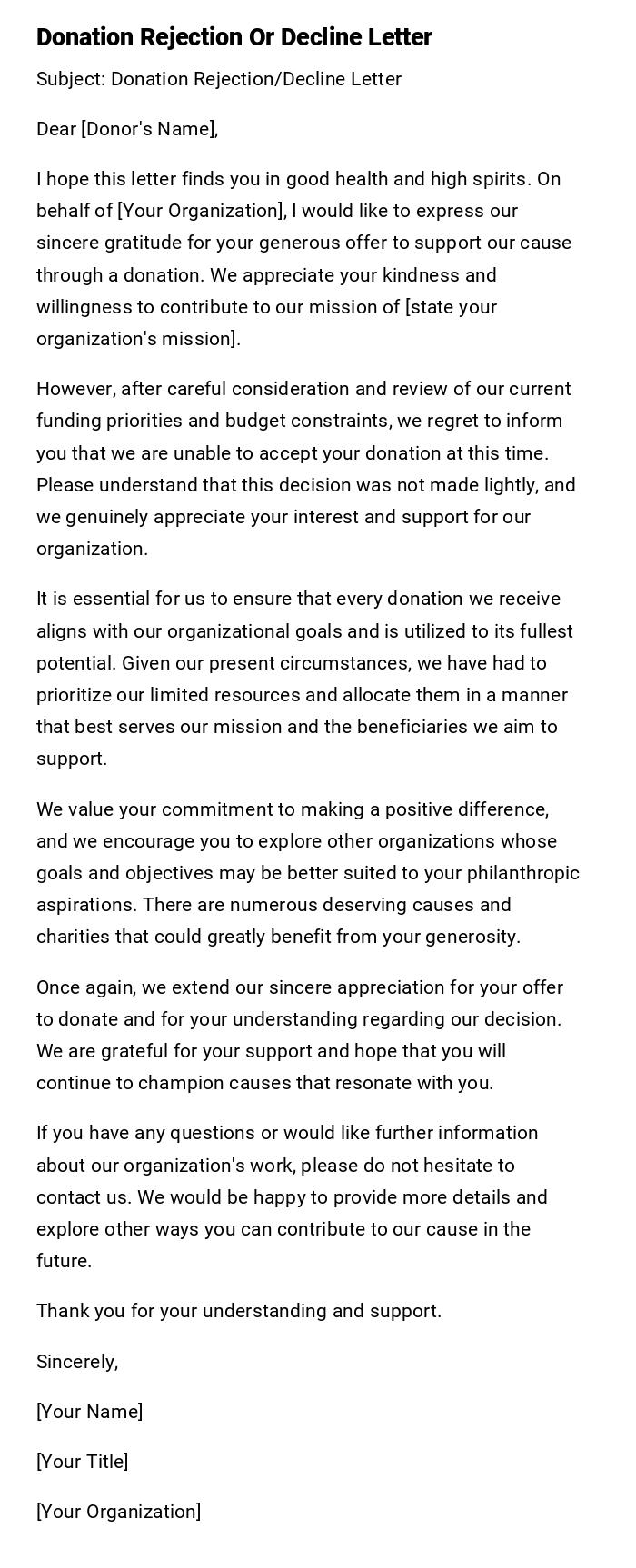
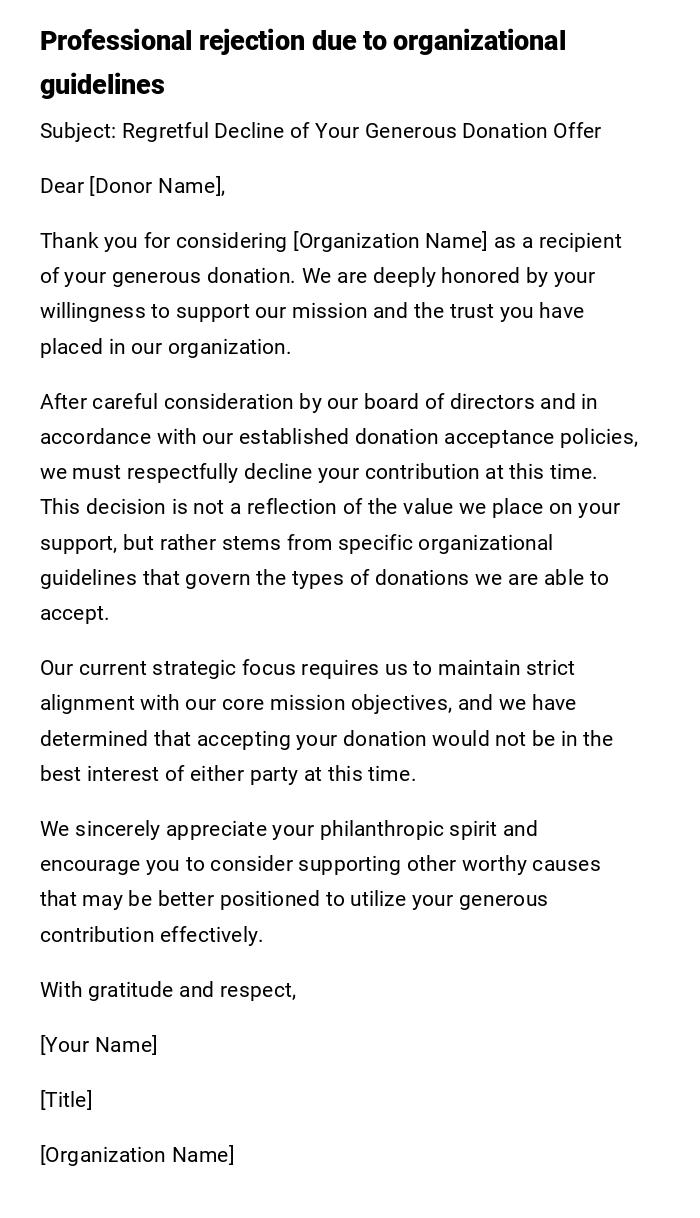
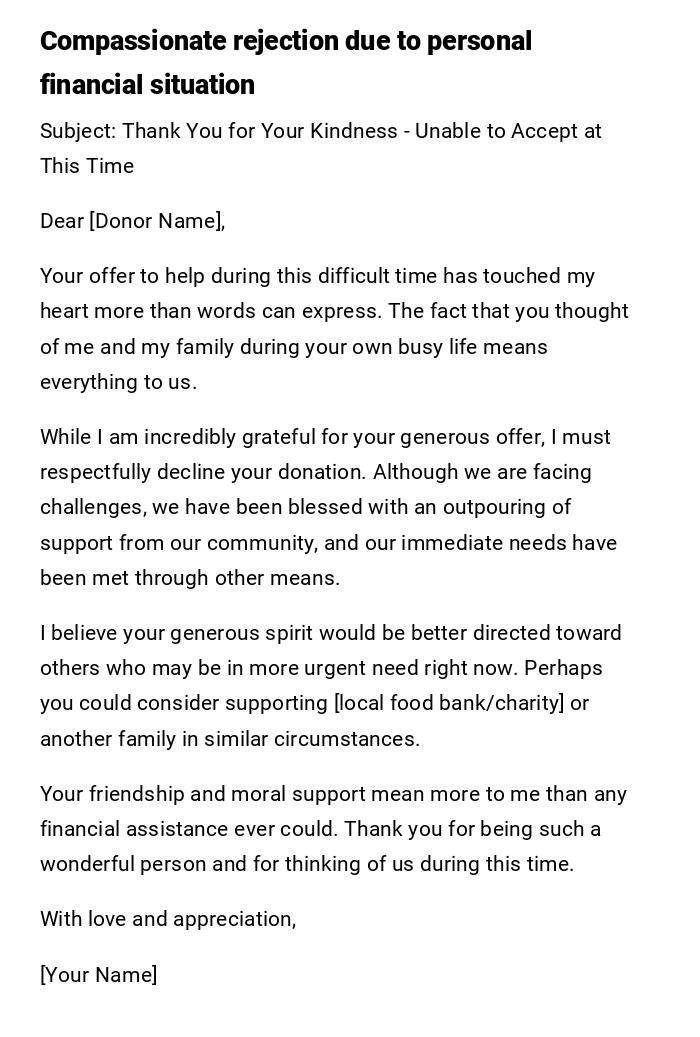
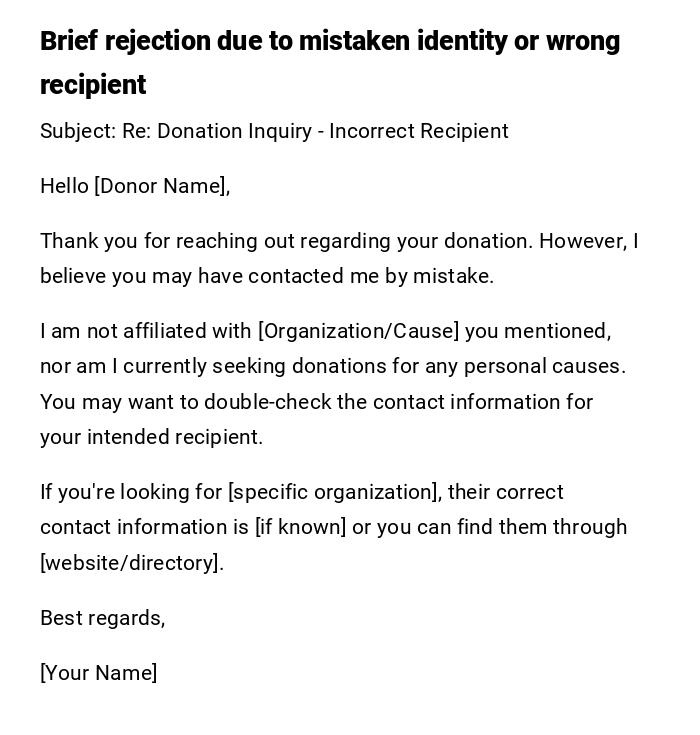
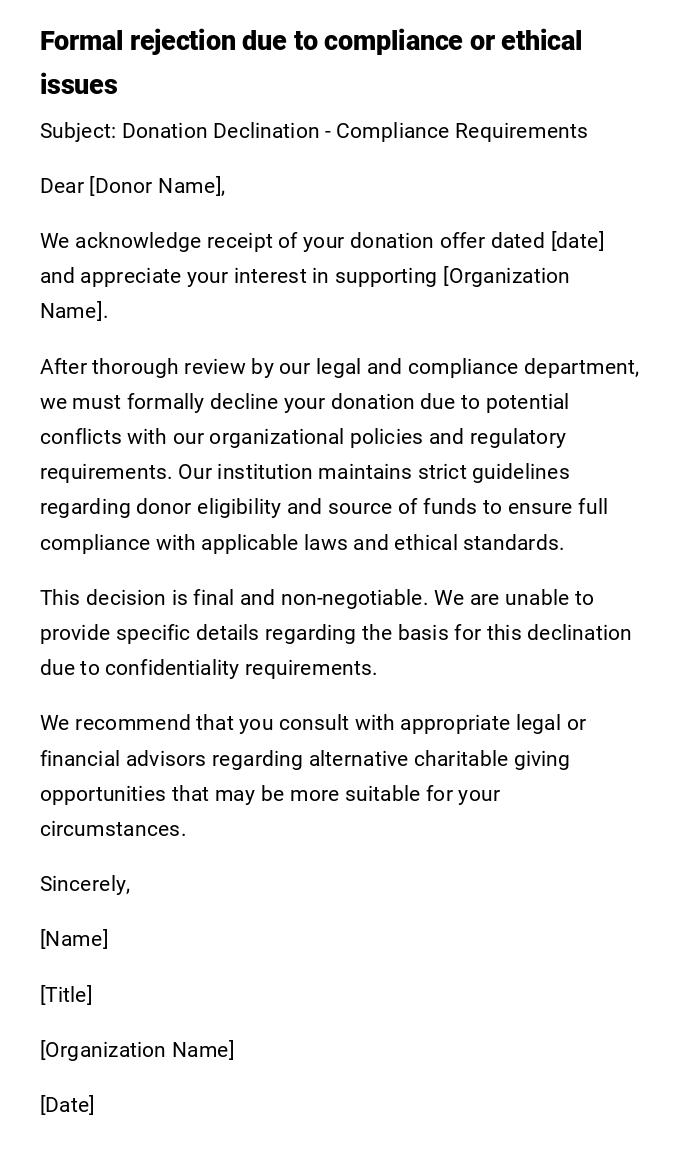
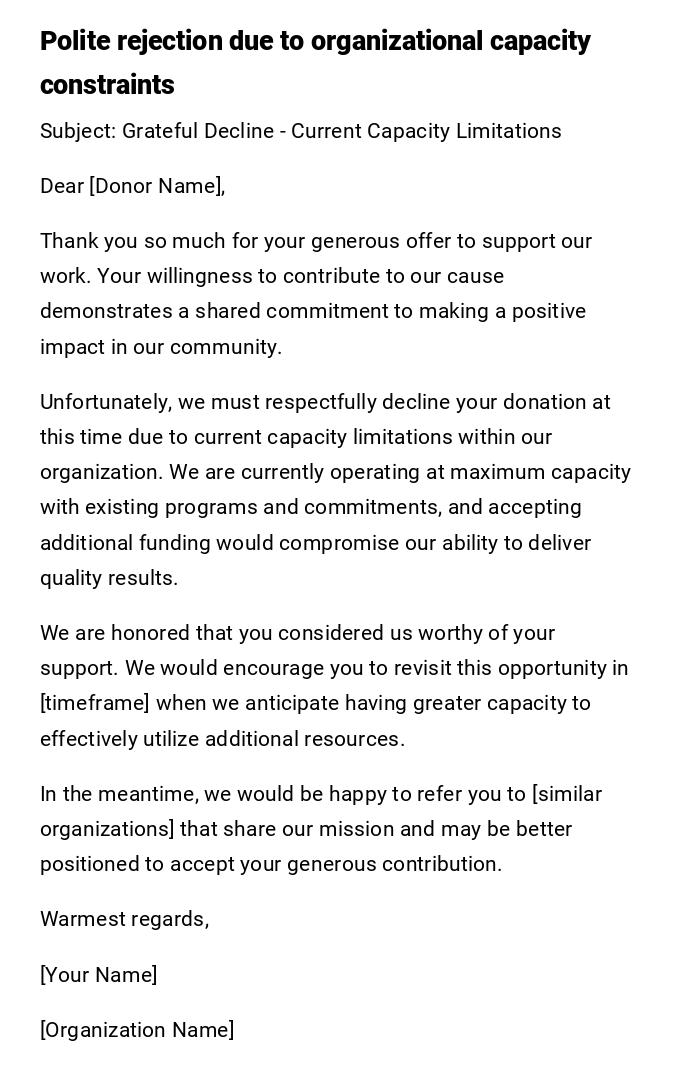
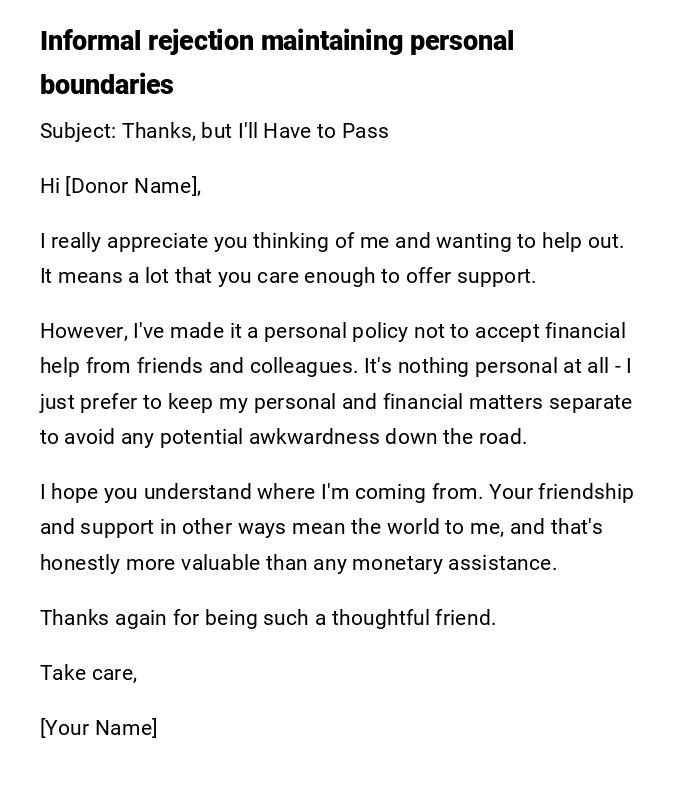
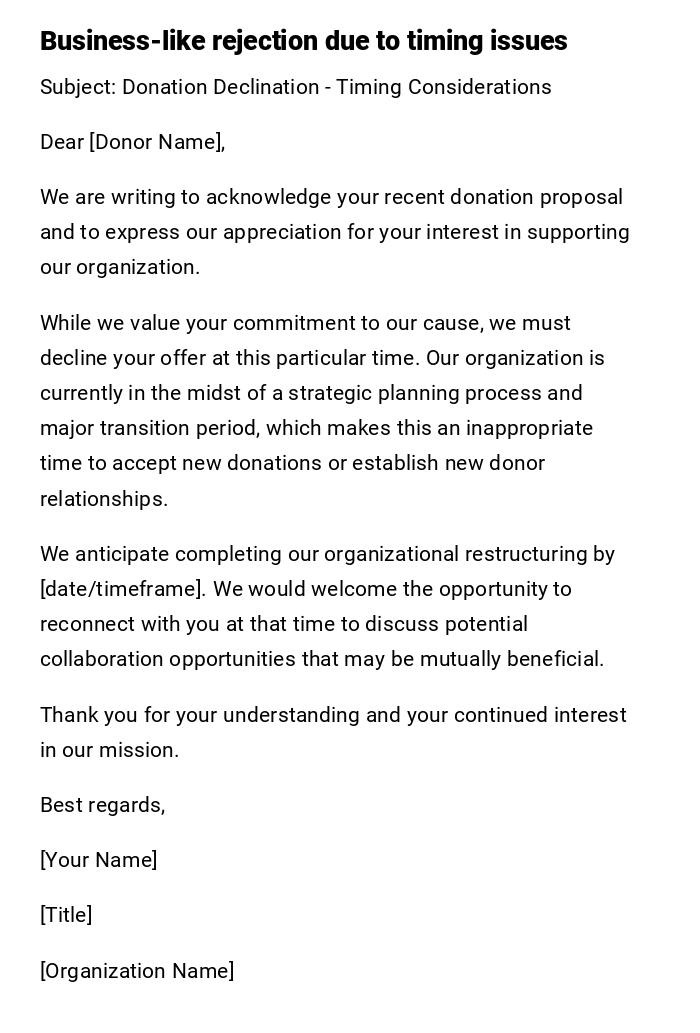
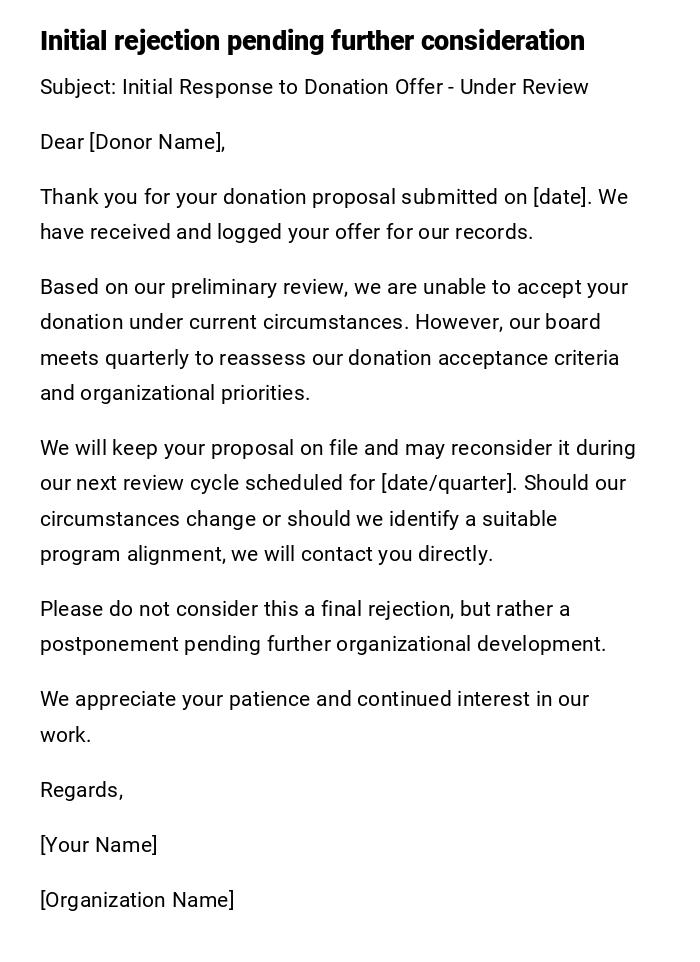

 Download Word Doc
Download Word Doc
 Download PDF
Download PDF